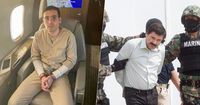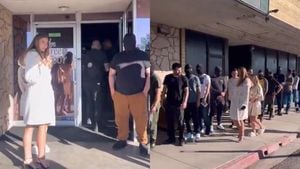The assassination of Ovidio Alfonso Guzmán López, the son of infamous drug lord Joaquín “El Chapo” Guzmán, has reignited the debate surrounding violence in Mexico and the government's role in combating drug trafficking. This event not only resonated within the realm of organized crime but also had far-reaching repercussions across various levels of society and national politics.
The operation leading to Ovidio's death unfolded in a tense atmosphere in Culiacán, Sinaloa, where he had established himself as a prominent figure within the Cártel de Sinaloa. Since his arrest in 2019, Ovidio had become a controversial figure, central to the struggle for control over territories and drug trafficking routes that dominate the country's illicit economy.
The impact of his death was immediate. Streets in Culiacán descended into chaos, with reports of gunfire and violence reflecting the cartel's desperate power struggle. The state's response to the violence raised significant questions about the effectiveness of security strategies implemented in the country, which often appear inadequate given the complexity of the situation.
Following the news of the operation, public reactions varied widely. While some celebrated the death of a drug trafficking leader, others criticized the lack of a comprehensive approach to tackling organized crime, which extends beyond simply eliminating key figures. The perception of a failed war on drugs intensified, with a clear call to rethink security policies and address the root causes of violence plaguing the nation.
In this context, Ovidio Guzmán's death underscores not only the bloody struggle for control of drug trafficking plazas but also invites reflection on the future of the country. The intersection of politics, corruption, and organized crime highlights the urgent need for solutions that can stem the tide of violence affecting countless Mexican families.
This incident serves as a reminder that the fight for peace in Mexico is a challenge that demands a committed, integrated approach—one that goes beyond immediate actions seeking quick fixes in times of crisis. Thus, the name Ovidio Alfonso Guzmán López will continue to echo in the national collective memory, symbolizing a struggle that remains unresolved and requiring deep analysis regarding the direction the country must take to effectively and durably confront these challenges.
According to the HBO Max documentary series Culiacanazo: Herederos del Narco, Ovidio Guzmán was envisioned as a student distanced from the Cártel de Sinaloa. The documentary features testimonies from journalists, authorities, members of organized crime, and government officials like Marcelo Ebrard, providing insight into the current state of drug trafficking in Mexico and the influence of 'Los Chapitos' on the drug landscape.
Journalist Luis Chaparro noted that Ovidio was always well cared for by his family, with 'El Chapo' aspiring for him to attend a private school. In an effort to steer him away from organized crime, Ovidio was sent to Mexico City to study at a Catholic institution called Ceyca. Despite these efforts, Ovidio was detained on January 5, 2023, and extradited to the United States later that same year.
After 'Chapo' Guzmán's arrest, Ovidio and his brothers—Iván Archivaldo, Jesús Alfredo, and Joaquín—took charge of their faction within the Cártel de Sinaloa. Joaquín was arrested on July 25, 2024, alongside Ismael ‘El Mayo’ Zambada. Ovidio, considered the most manipulable of the brothers, was seen as a key figure within 'Los Chapitos,' although the most critical decisions were made by Iván Archivaldo, who aimed to establish himself as a legend in the narcotics world, surpassing even his father's notoriety.
The documentary reveals that the violent events surrounding Ovidio's earlier capture in October 2019, known as the first 'Culiacanazo,' left Culiacán resembling a war zone. After federal forces attempted to detain him, the city erupted in violence, leading to his release just hours later. The Executive Branch later explained that this decision saved hundreds of civilian lives, but it left the city in a state of chaos, with burned cars and shattered glass littering the streets.
On October 18, 2019, the aftermath of the first Culiacanazo was evident, with residents expressing fear and uncertainty. Classes were canceled, and the atmosphere was thick with the smell of gunpowder. The government reported casualties from the operation, including one civilian and several security personnel, but many locals and journalists claimed the actual toll was far higher.
Marcelo Ebrard, the current Secretary of Economy, asserted that authorities must take risks when apprehending drug lords but should avoid causing mass casualties among civilians. He stated, “We will combat crime, but not with the same violence they use. Blood in politics cannot be washed away.”
Ovidio Guzmán's release during the first Culiacanazo unexpectedly influenced public perception, leading some to name their children after him and adopt aspects of his style. He became a symbol of narcoculture, drawing attention from U.S. authorities who were already interested in apprehending him.
Despite claims from federal sources that Ovidio was not under investigation prior to the 2019 incident, U.S. interests in capturing him were evident. Christopher Landau, then U.S. ambassador to Mexico, expressed frustration at not being notified of the operation that day, while Ebrard emphasized the collaboration between U.S. and Mexican authorities during the capture.
In the lead-up to the 2019 operation, the Drug Enforcement Administration (DEA) had met with Sinaloan officials, and reports indicated that 150 DEA agents had entered Culiacán in civilian clothing. This suggests a level of coordination that raises questions about the effectiveness of security measures and the ongoing struggle against organized crime in Mexico.
The assassination of Ovidio Guzmán is not just a significant event within the realm of organized crime; it symbolizes a broader, systemic issue facing Mexico, one that demands an urgent and comprehensive response.





